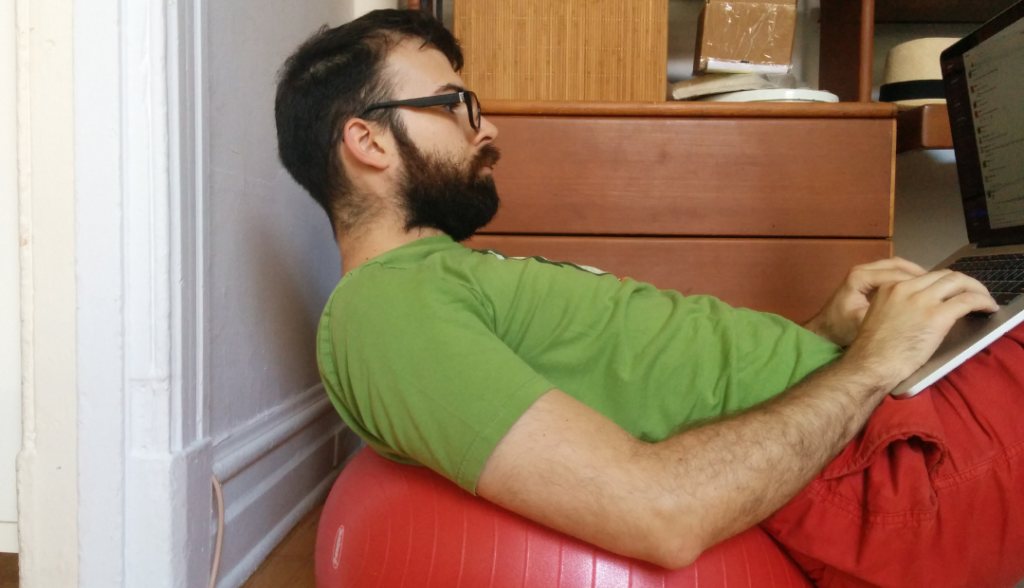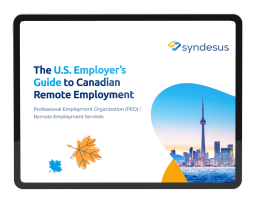How a Haskell programmer found his dream job working for a US company while keeping his dream life in Canada
The Problem
The world of software development is diverse. There are multiple disciplines, languages, and specializations. It takes a cohesive team of various tech skills to create a user-friendly product or service.
Many Canadian tech workers feel they must uproot their lives and move to the US for their dream job. But is it possible to pursue work for a US company that aligns with a developer’s values and passions…and stay in Canada?
A few years ago, developer Samuel Gélineau faced a similar question in his home city of Montreal. After studying computer science at McGill, he took a keen interest in functional programming languages, like Haskell, and began to eagerly search the job market.
Haskell, unlike other popular languages, uses mathematical functions rather than sequences of steps – making it easier for developers to think about problems in isolation in order to fix any bugs.
He was quickly discouraged by the lack of companies who did not see the value in functional languages. There were very few companies in Montreal (and perhaps in the industry) who had any interest in hiring Haskell developers at that time.
“I knew that my chances were slim,” he explains. “Not only did I have a misconception of what the job market looked like when I began, I also had a misunderstanding of the market of Haskell companies, which ended up being much smaller than I thought.”
The Impact
Samuel accepted another job that did not require his unique expertise, thinking that was the best he could do. He still dreamt of applying his ideas in Haskell-based problem-solving. He even ran networking events and meet-ups in the city to discuss the niche.
He felt discouraged with his work environment. He explains the last straw was when his team laughed and dismissed a Haskell inspired solution he recommended.
“That’s when I realized I needed to find a group of peers with whom I would share more of an understanding of what constitutes good software,” said Samuel.
Soon Samuel was contacted by a recruiter. This was his chance to get help finding the Haskell job he wanted. He quit before he had another job, which he admits was a mistake. It was much harder to find a Haskell job than he ever thought.
“There were only three companies. It was a disappointingly short list.”
That recruiter eventually introduced Samuel to SimSpace, a leading cyber security company based in Boston, MA. The company started six years ago with one common vision: ‘quantify cyber risk by considering people, process and technology.’

The company purposefully chose Haskell to deliberately seek out innovative developers that were dedicated to their craft.
Syndesus serves as a centralized HR resource, and provides Samuel with training about remote working and other resources.

While Samuel searched for the right fit to fulfill his Haskell dreams, SimSpace was developing their cyber range platform and growing quickly.
They were struggling to find developers that were a good fit and trained in functional programming. The company purposefully chose Haskell to deliberately seek out innovative developers that were dedicated to their craft.
SimSpace hired Samuel as a Haskell programmer, but he wanted to stay in Canada for his family. Though he was thrilled for the opportunity, it was important for him to live in Montreal.
The Solution
“My first assignment was to figure out how they could pay me, because they’re in the US and I’m in Canada,” he says.
After doing some research, Samuel found multiple ways to approach this.
First, he could start his own company and they could pay him as a consultant. Second, SimSpace could create a Canadian office, and subsequently would need to navigate Canadian business law.
Finally, Samuel found an article that explained a third possibility – Sam could use a PEO model, like Syndesus, to employ him on behalf of SimSpace. He pitched it to his boss.
SimSpace loved the idea and pursued hiring Samuel through Syndesus’ PEO service. Syndesus employs him – taking care of taxes, healthcare, legal requirements, payment, and other HR services. Samuel can focus on his career.
“Having the opportunity to have a third party take care of those details was something both SimSpace and I were very happy with,” he says.
The Results
Samuel says he’s grown with the company, moved up the ranks, and now wears many hats. In addition to his role as a developer on the company’s ‘Team Dream’, he also serves as the backend architect in a company-wide forum that establishes company processes.
Building his expertise with SimSpace and expanding his network, Samuel is also becoming an active thought leader in the space. He streams functional programming lessons at twitch.tv/gelisam and on YouTube at haskellcat.com.
He’s now worked at SimSpace for four years, watching the team grow from two back-end developers to nearly 50. Samuel’s Canadian team of four is one of the higher performing teams in the company.
“And they’ve all been hired by me,” Samuel jokes, and admits he can’t take all the credit, it’s a large team effort bringing qualified people in who are equally focused on the company vision.
But because of his extensive network focused on the Haskell niche he’s been able to refer several team members who have been essential in expanding the Canadian team.
Future Plans
When asked about the culture at SimSpace, he smiles: “Bread and beer.” He explains that during the lockdown the team bonded over baking bread together online, and shared a mutual love of local craft beer.
SimSpace has created a tightly-knit group who focus on professional development through mentoring.
Since the Haskell community is so small, Samuel explains he’s now working with industry thought leaders; many of the developers he looked up to while learning the language.
“You see posts by the big names in the Haskell community, and once you join SimSpace, you see: ‘Oh wow! So many of those names I recognize from online!’ You get some one-on-one time with your heroes.”
Samuel says working for a PEO is good. Syndesus serves as a centralized HR resource, and provides Samuel with training about remote working and other resources.
For the most part, he says, they serve from the background. He takes all of his direction from SimSpace and is deeply ingrained in the company like any other employee.
When asked if he has any advice for other tech workers, he agrees that a PEO model is the way to go, especially for niche languages. Staying open to working for a US company presents unique opportunities for Canadians to get Haskell jobs.
“It worked for me. And Syndesus is a great way to make that possible.”
Samuel says he feels grateful that he’s accomplished many of his goals and is proud of his career. He now has more authority, not only in SimSpace, but also in how the industry is progressing Haskell.
“It’s beyond my wildest dreams,” he says.
“I already have everything I want. I guess my goal is to keep it.”







